Research Article
SHAPING FUTURE-PROOF PROFESSIONALS: TRANSFORMING COMPETENCIES OF GRADUATE EDUCATION OF DEVELOPMENT AND PUBLIC ADMINISTRATION
5012
Views & Citations4012
Likes & Shares
ABSTRACT
The convergence of cyber-physical systems and the internet of things in this era of the Fourth Industrial Revolution (FIRe) provides a signal of change on the futures of the workforce in the public and private sectors. Hence an intelligent public sector agency must be steered by digitally-savvy and future-proof development and public administration professionals. Thus, this study aimed to map the competency of development and public administration graduate programs toward becoming future-proof professionals. The study was conducted using a qualitative research method wherein data were collected from primary and secondary data. Results of the study revealed that the degree holders of the Masteral Programs must be equipped with the following cross-cutting competencies: Data Analytics for Public Decision-Making; Futures Thinking; Planning and Managing Change and Development; Resource Mobilization; and, Innovation in Developing High Impact Research. Distinct competencies must be developed with the MPA graduates on Ethical and Responsive Leadership; Leading Organizational Innovation; Resource Mobilization; and, Management of Human Capital. Moreover, the MSDA graduates must be competent in Collaboration towards Transnational Development, Analytical Tools for Development, and Strategic Foresight and Development Planning. Further, MSDC graduates must be capable of Designing Strategic Communication and take the lead in Social Change, Peace Advocacy, and Development. For the Ph.D. in Development, graduates must be distinctively competent in Leading Change and Innovation; Big Data Analytics; Foresight and Development Planning; Resource Mobilization; Building Collaboration; and, Innovation in Developing High Impact Research and Knowledge Generation. Graduates of the programs are founded on creativity, people management, emotional intelligence, and critical thinking.
Keywords: Future-proof, Competencies, Graduate Education, Digital Government.
INTRODUCTION
The Fourth Industrial Revolution (FIRe) shapes every aspect of the people's everyday lives; navigates the institutional transformation; opens the opportunity of reimagining and reinventing the industry's business model, reinventing the public institutions, and redefining the country’s economic development for global competitiveness. It is now the era of the digital revolution that serves as the springboard of social, economic, political, and institutional modernization. This unprecedented change is described by the Asian Productivity Organization (APO) as “Smart Transformation,” this means digital governance, intelligent services, intelligent agriculture, smart transportation, and innovative campus.
The advancement of Information and Communication Technology (ICT) has substantially improved human and institutional productivity. However, the convergence of the internet of things, services, virtual and augmented reality, and artificial intelligence may impact the future of work in the public and private sectors. The future competencies of the workforce are different from what was designed in the era of computing. Competencies of the present labor market may no longer be relevant in the future due to the rapid technological change. (Oliveri,2020). espoused a need to change how people make decisions and cultivate critical knowledge about the future. The author further stated that for the future to be better to live in after the COVID-19 crisis; people must be equipped with the skills of futures literacy, systems thinking, strategic foresight, and anticipatory thinking. It is corroborated by the Future Jobs Report 2020 (WEF, 2020). that the top and in-demand skills across jobs change in the next five years includes “critical thinking, problem-solving, and skills in self-management such as active learning, resilience, stress tolerance and flexibility”.
In the Philippines, the government allocated three billion pesos under the Bayanihan Act 2 for the digital transformation of state universities and colleges and the development of intelligent campuses in response to the challenges of the COVID-19 crisis. This enormous investment is on top of the intelligent campus initiatives of the state universities and colleges, which benefited the 1,729 of the total 2,396 HEIs in the Philippines before the global health pandemic (Chao, 2021). However, the digital transformation initiative of State Universities and Colleges started even before the global health pandemic, and it is only accelerated due to the necessity as a consequence of the implementation of flexible learning when the government declared a national emergency.
With the issuance of the Commission on Higher Education (CHED) CDO 15, s. 2019 also called the “Policies, Standards, and Guidelines in Graduate Education”; the requirements of Program Accreditation, and the Certification of Program Compliance (COPC), the higher educational institutions graduate programs must have to comply with these policies and guidelines. These policy initiatives provide the opportunity for innovation in the design and revision of the graduate programs, which intends to produce professionals equipped with the competencies aligned with the higher education typology and must be at par with the universities in the rest of the world. Professionals who are competitive in the next three years and ready to face the challenges of the skills needed in the future.
The University of Southeastern Philippines (USeP) - College of Development Management (CDM) is one of the colleges of the university that spearheaded the project of curriculum revision of the following programs: Master of Science in Development Administration (MSDA), Master of Science in Public Administration (MPA), Master of Science in Development Communication (MSDC) and Doctor of Philosophy Program of Development.
OBJECTIVES OF THE STUDY
The rapid technological change brought about by FIRe and the socio-cultural shift towards a digital society in the future. Preparing the professionals for the future of work requires collaboration with the internal and external stakeholders to produce a future-proof workforce. Thus, this study aimed to map the development and public administration graduate education competencies of USeP-CDM towards becoming future-proof professionals.
REVIEW OF RELATED STUDIES
Innovation in Graduate Education.
With the new globalization and impact of the digital revolution accelerated by the COVID-19 crisis to higher educational institutions, the Philippines' universities and colleges are now entering a highly competitive global market of distance education using technology as a platform for designing curriculum and instructional delivery. To get a share of the global industry of higher education, innovation is the key. The National Science Foundation (NSF, 2020) defined graduate education innovation as the “transformative approaches of development and implementation of a new idea, model, and method of graduate education training.” Similarly, the Concordia University of (Chicago,2020). argued that innovation can come in many forms; it can be the delivery of the program itself and the curriculum within the program”. Thus, graduate education innovation may come from the curriculum, instructional delivery, and learning outcomes assessment. This is to ensure that the professionals' graduates are equipped with the competencies and learning outcomes that meet the industry's expectations that are not only at present but also its relevance in the future. However, Mezied (2016) argued that higher education must be redefined and revolutionized to ensure effective and immediate transformation. Universities need to be strategic in utilizing the experience of credentials, trust, and identity to offer a unique value proposition of graduate education. With the disruption of higher education, status quo commitment is no longer an option; there is a need to innovate and embrace change to survive a highly competitive environment.
Outcome-based Graduate Education (OBGE)
There are several approaches to graduate education curriculum development, and one of the popular models or frameworks is the use of outcome-based education. William Spady originally developed OBE in the 90s, which intends to transform formal education from the conventional teacher’s driven learning processes and outcomes to prioritizing the ends, purpose, accomplishments, and results. This means bringing the “focus of formal education to what the students as the end-users learn rather than what they were taught.” OBE is a schooling system that prioritizes ends, purpose, accomplishments, and results (Rao, 2020). It is important to note that (Tucker,2017). as cited by (Katsuri,2017). described OBE as a process of “reengineering curriculum, assessment and reporting practices in education to reflect the achievement of high order learning and mastery rather than the accumulation of course credits.” (Katsuri ,2017). argued that the objective of using OBE is to “facilitate desired changes within the learners, by increasing knowledge, developing skills and positively influencing attitudes, values, and judgment.” The author employed a survey method to generate graduate attributes to design the curriculum, program objectives, and course and topic learning outcomes. Thus, OBE is a framework that identifies the needs of the learners and formulates the Program Educational Objectives (PEO) and Program Graduate Outcomes (PGO). Strategies and mechanisms of achieving the desired graduate objectives and learning outcomes must be vertically aligned.
Competency-based Graduate Education (CBGE)
Another approach to improving the quality of graduate education is the competency-based education introduced in the 1960s to respond to the growing concerns on the capacity of the graduates in the labor market. (Malan,2000). as cited by (Katsuri,2017). summarizes the salient features of competency-based education as; “explicit learning outcomes, flexible timeframe to master skills, variety of instructional activities to facilitate learning, criterion-referenced testing of the required outcomes, certification based on demonstrated learning outcomes, adaptable programs to ensure optimum learner guidance, and support for the notion the learner is accountable for his or her achievement.” This is corroborated by the study of (Vasquez et al.,2016). the authors pointed out that competency-based education (CBE) has been widely cited as an educational framework in “designing educational programs that reflect four critical features: a focus on outcomes, an emphasis on abilities, a reduction of emphasis on time-based training, and promotion of learner centeredness.” However, (Gervais,2016). stated no standard definition of competency-based education, and agreement on the criteria that encompass this model is necessary.
In the study of (Kim,2015). the author argued that competencies could neither be applied in curricula nor learning objectives. Instead, it is used as a framework based on performance outcomes around which the curriculum is developed and delivered following the performance that will be measured. This means that a competency-based curriculum is used to identify competencies that can be applied in the real world of practice. “Competency-based approach is effective, sustainable, and can be customized to address the skill gaps in the rapidly evolving information professions.” In the study of (Smith, Hernandez & Gordon,2018).the authors argued that “competency framework is a collection of competencies that clarify successful performance in different roles at different levels throughout the organization.” Competency frameworks are a network of knowledge, skills, attitudes and other facets (KSAOs) that can have many nonexclusive relationships”. The authors further argued that competency framework can be used as an essential instrument in “developing curriculum and selecting training materials, identifying licensure and certification requirements, writing job descriptions, recruiting and hiring workers, and evaluating employee performance.”
Future-proof Professionals
The acceleration of the digital transformation of the public sector and industry yields negative and positive effects on the future of jobs. Professionals must be resilient and adaptable to the rapid change of technological, social, and economic situation of both local and international. Professionals must be equipped with the knowledge and skills needed in the future. This means that professionals must be future-proof. (Rich,2014). defined future-proof as the “process of anticipating the future and developing methods of minimizing the negative effects while taking advantage of the positive effects of shocks and distresses due to future events.” The study of (Johnson & Simon,2018). espoused that professional must develop skills for the present with the future needs of pursuing graduate education to be more adaptable to an evolving digital institution.
Furthermore, (Frot,2018). argued that the global trends of “demographic changes, digital transformation and rapid advances in technology have changed how consumers shop, businesses operate and people work.” The author projected that the job description wouldn’t be the same in the coming years. Thus, there is a need to be prepared in order not to be left behind. Professionals must be critical in aligning to the growing sector, be digitally native, consider going solo, embrace change, and level up to advanced education studies.
Thus, this study is anchored on the theory of OBE and CBE in the transformation of the competencies of the graduate education of the CDM. Innovation in the curriculum revision of the Ph.D., MPA, MSDA, and MSDC programs is imperative so that the college can produce professional graduates that are responsive, resilient, and adaptable to the demands of the labor market in the future.
METHODOLOGY
A qualitative research method was used in this study, particularly the application of action research as the research design. Action research is the appropriate research design; hence, the study explored a strategy of locating the gaps and opportunities as an avenue of graduate education innovation based on the experiences and insights of the internal and external stakeholders. The study primarily relied on collecting primary data from the scoping of documentation reports, transcription of the in-house college workshops, virtual conferences, lecture series, committee meetings, and college research conferences. Series of virtual external stakeholders’ consultations were conducted, represented by Undersecretaries, Regional Directors, and agency heads of the Philippine Institute of Development Studies (PIDS), Industry, Graduate Students, Non-government Organization, and professors from other universities. Action learning and reflection were used to make sense of the qualitative data. Thematic analysis was used to identify and map the graduate outcome/competency of the college's Ph.D., MPA, MSDA, and MSDC graduates.
RESULTS AND DISCUSSION
The results of the study revealed the following findings:
Doctor of Philosophy Program (Ph.D.)
The Doctor of Philosophy program is designed to develop and produce graduates adept in development perspectives to lead change and economic growth in the local and international context. It specializes in development research administration, sustainable development administration, institutional development administration, and urban and regional development administration. Anchored on futures thinking and strategic foresight, the program equips the graduates with the core and essential competencies responsive to the needed skills set in the future.
Ph.D. Graduate Outcome/Competency and Indicators.
Results of the study revealed that the graduates of the Doctor Philosophy Program should be equipped with the following competencies: leading change and innovation, managing people and communities, demonstrating entrepreneurial foresight on knowledge generation, strategizing resource mobilization, producing high-impact research towards development, building effective collaboration, and leading futures thinking in development planning. These identified competencies serve as a guide in developing the courses and performance indicators Ph.D. program structure (Table 1). A graduate of Doctor of Philosophy must have cultivated the culture of independent learning, demonstrated novelty in development research, and contributed to the body of knowledge through dissertation studies.
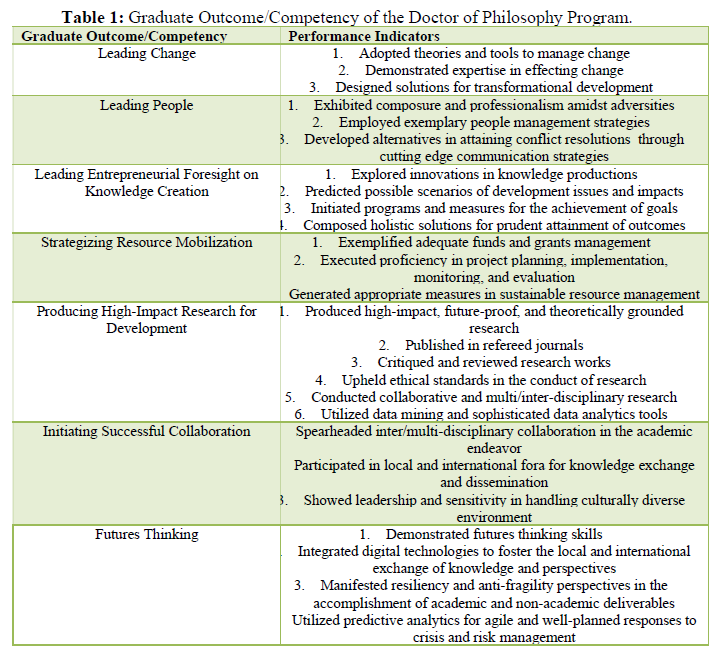

Master of Public Administration (MPA)
This program is designed to enhance the student’s ability to understand, analyze, and control the organizational environment to manage effectively and to promote positive change in the public and nonprofit sectors. The program blends theories and applications. The curriculum focuses on government administration, policy analysis, financial management, administration of government agencies, knowledge management. And strategic human resource management.
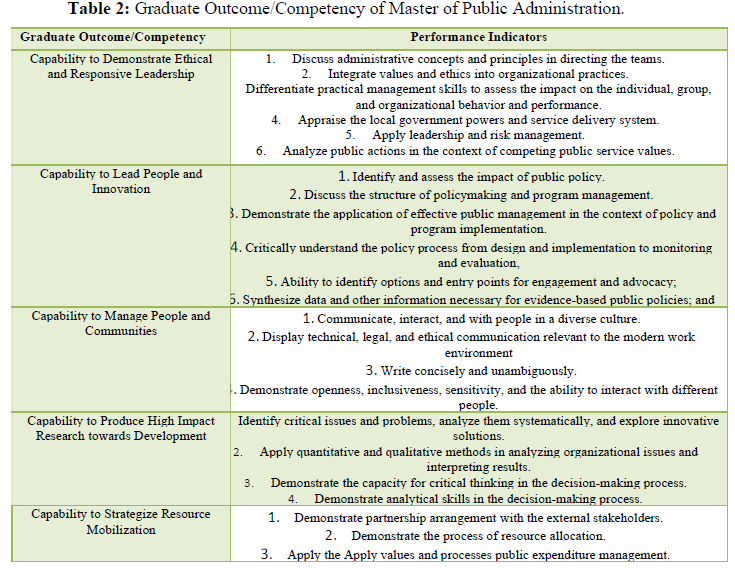
MPA Program Graduate Outcome/Competency and Indicators
Based on the results of the study, an MPA graduate must be equipped with the following competencies: strategic human resource management, global leadership and governance, ethical leadership, government innovation, people management, data analytics, resource governance, planned change and development, political economy analysis, futures thinking, and, capable of producing high impact research on government and public administration. These competencies serve as a guide in identifying and mapping the courses and performance indicators of the program structure of MPA with the following majors: organization studies, fiscal administration, public policy, and public safety administration (Table 2). According to the study of Skorková (2016), over the last 30 years, the public administration systems have been subjected to significant reforms, and competency management has been implemented in the public sector among the OECD countries. This suggests that the theory of competence, competency models, and holistic managerial competence have been used in the public sector in recruiting, communication with employees, and tailor-made training and development processes.
MSDA Program Graduate Outcome/Competency and Indicators
Based on the study results, it revealed that an MSDA graduate must be equipped with the following competencies: development planning, political economy analysis, data analytics for development policy innovation, collaboration and strategic negotiation, sustainable development, futures thinking, and produce high impact research. These competencies provide a guiding post in identifying and mapping the courses of MSDA program structure with the following majors: sustainable development administration, disaster risk management, environmental planning, and urban and regional development (Table 3).
Master of Science in Development Communication (MSDC)
This program is designed to develop competencies in any or all of the communication areas in development: theory building, research, education and training, policy development, and program planning and management.
MSDC Program Graduate Outcome/Competency and Indicators
The study's findings revealed that MSDC graduates must be equipped with the competencies of data analytics, strategic communication, digital communication, social change for development, and leading futures thinking. Courses are developed and aligned with these competencies in crafting the MSDC program structure (Table 4).
Fundamental and Core Competencies of the Graduate Programs of the College
Revealed in the study that the graduates of the Ph.D., MPA, MSDA, and MSDC must be equipped with the fundamental competencies of continuous lifelong learning, integrity and honesty, interpersonal skills, oral communication, public service motivation, and written communication. These fundamental competencies support the formation of the core competencies of the graduates. Sudirman et al., (2019). This study’s findings suggest that communication, organizing, information seeking, analytical thinking, and planning are common competencies essential for effective public middle managers. Conversely, achievement orientation, leadership, directiveness, persuasiveness, and innovation are competencies that characterize effective general middle managers and distinguish them from average performers. In addition, some other new competencies inductively obtained using a thematic analysis are also crucial for effective public managers: adherence to laws and regulations, multi-stakeholder collaboration, and technical competencies (technology management, human resource management, and financial management).
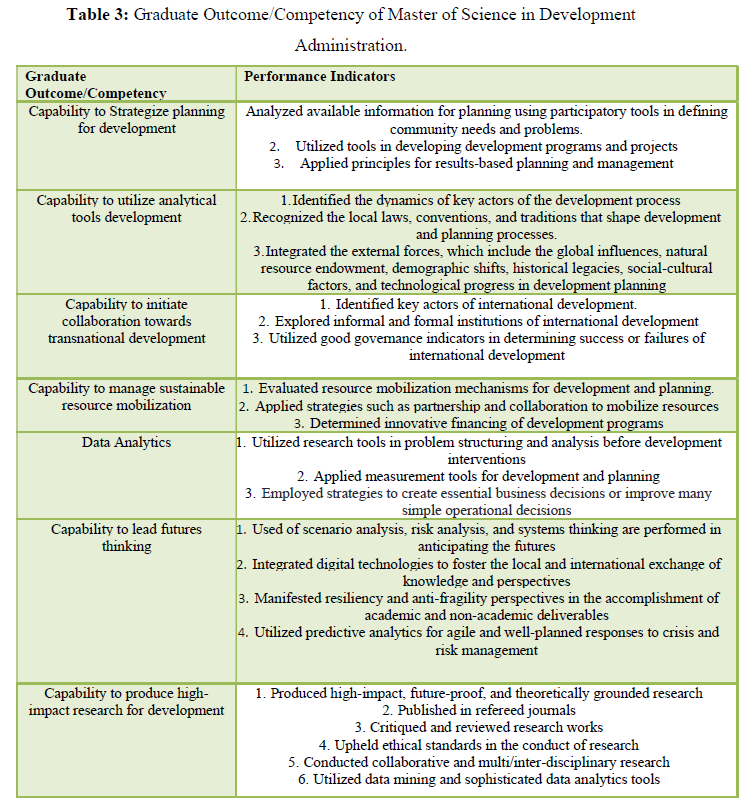
The revision of the college's graduate programs and the new competencies developed will prepare the future leaders of the public sector. This is corroborated by the study of Baimyrzaeva and Meyer (2021); findings revealed that the new competencies acquired by professional graduates could think systematically, see the big picture, and solve complex problems. The study further revealed that skilled graduates are ambassadors of government innovation: have the “strong capacity to foster collaboration among the diverse stakeholders; model ethical and inclusive behavior; accommodate, facilitate and bridge competing and conflicting viewpoints, and creative innovators who can operate in increasingly complex environments while navigating and reshaping the governments' outdated institutional structures.”
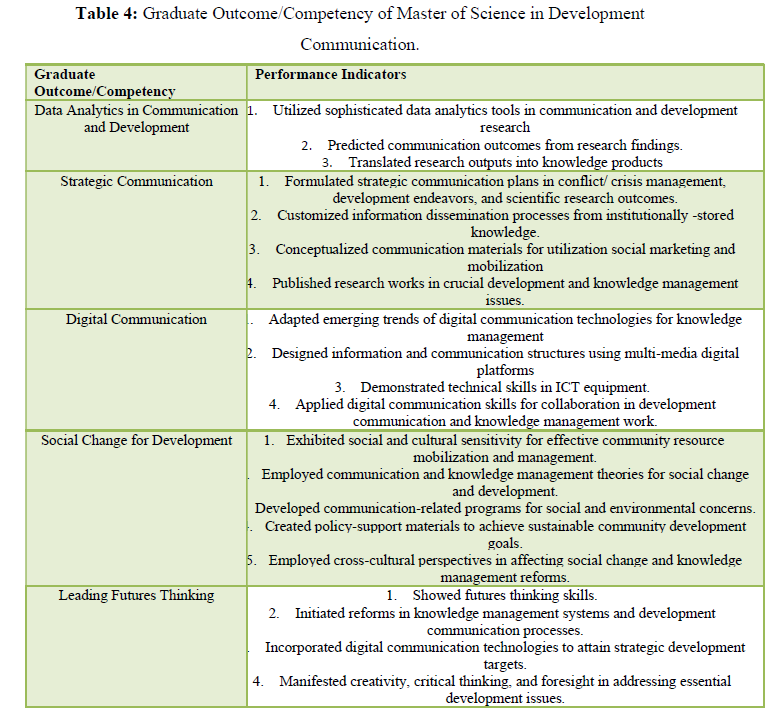

Fundamental and Core Competencies of the Graduate Programs of the College
Revealed in the study that the graduates of the Ph.D., MPA, MSDA, and MSDC must be equipped with the fundamental competencies of continuous lifelong learning, integrity and honesty, interpersonal skills, oral communication, public service motivation, and written communication. These fundamental competencies support the formation of the core competencies of the graduates. Sudirman et al., (2019). This study’s findings suggest that communication, organizing, information seeking, analytical thinking, and planning are common competencies essential for effective public middle managers. Conversely, achievement orientation, leadership, directiveness, persuasiveness, and innovation are competencies that characterize effective general middle managers and distinguish them from average performers. In addition, some other new competencies inductively obtained using a thematic analysis are also crucial for effective public managers: adherence to laws and regulations, multi-stakeholder collaboration, and technical competencies (technology management, human resource management, and financial management).
The revision of the college's graduate programs and the new competencies developed will prepare the future leaders of the public sector. This is corroborated by the study of Baimyrzaeva and Meyer (2021); findings revealed that the new competencies acquired by professional graduates could think systematically, see the big picture, and solve complex problems. The study further revealed that skilled graduates are ambassadors of government innovation: have the “strong capacity to foster collaboration among the diverse stakeholders; model ethical and inclusive behavior; accommodate, facilitate and bridge competing and conflicting viewpoints, and creative innovators who can operate in increasingly complex environments while navigating and reshaping the governments' outdated institutional structures.”
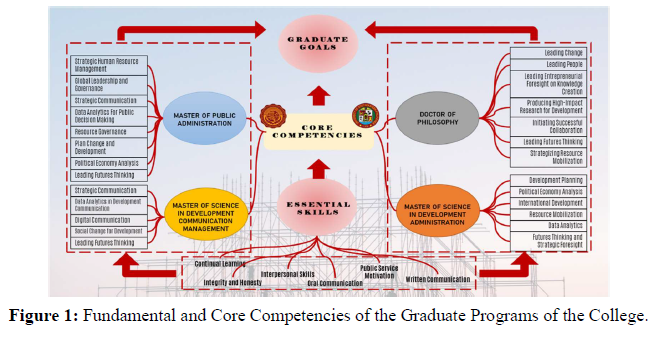

CONCLUSIONS AND IMPLICATIONS
Based on the findings of the study, the following conclusions are drawn:
The goal of graduate education is to shape the competencies of the professional graduates of the college to be more competitive, relevant, and future-proof. A graduate of Doctor of Philosophy should be equipped with the competencies of leading people and change, strategic foresight, effective in strategic negotiation and collaboration, strategic human resource management, cultivated the capability of futures thinking, and can generate scientific knowledge, and create development impact in the local and international development community (Figure 1).
As the digital revolution continues to shape the government sector, professionals in public administration should be equipped with competencies that are responsive to the transformation of public institutions. Graduates of the MPA program must demonstrate capabilities in strategic human resource management, global leadership and governance, strategic communication, data analytics in shared decision making, resource governance, planned change and development, political economy analysis, and futures thinking.
Development practitioners in the future must be equipped with the competencies of development planning, international development, political economy analysis, resource mobilization, data analytics, and future thinking. MSDA graduates must be able to demonstrate these competencies if they want to be relevant in the future.
Along with the advancement of ICT and the emergence of digital technologies, a graduate of MSDC must be equipped with the competencies of data analytics, strategic communication, digital fluency, social change for development, and futures thinking.
Based on the conclusions of the study, the following implications are drawn:
Futures thinking and strategic foresight cultivate critical knowledge of the future of jobs. Universities and colleges must develop futures literacy in the design of the curriculum and learning competencies of the graduates.
Outcome-based graduate education and competency-based curriculum design should be the guiding framework in mapping the core competencies of the graduates. It is imperative that in the quest to transform the competencies of the graduates of graduate education, it is anchored on the vertical and horizontal logic in developing the program structure and curriculum map.
Future-proof professionals are equipped with the core and fundamental competencies of the FIRe and signals of future change. The artifacts of the future of jobs build the conceptual foundation of the preferred competencies of the Doctor of Philosophy in Development, Master of Public Administration, Master of Science in Development Administration, and Master of Science in Development Communication.
- Asmaa Abu Mezied (2016). What role will education play in the Fourth Industrial Revolution? Available online at: https://www.weforum.org/agenda/2016/01/what-role-will-education-play-in-the-fourth-industrial-revolution/
- Asian Productivity Organization, (2020). Smart Transformation. Available online at: https://www.apo-tokyo.org/wedo/smart-transformation/
- Baimyrzaeva, M., & Meyer, C. T. (2020). Megatrends and the future of work for public sector leaders and educators. International Journal of Public Leadership, ahead-of-print (ahead-of-print). Available online at: http://doi:10.1108/ijpl-07-2020-0064
- Chao Jr., R.Y. (2021). Edtech lessons and innovation after COVID Available online at: https://www.universityworldnews.com/post.php?story=2021081811550718
- Concordia University Chicago (2021). The Benefits of Innovation in Graduate Programs. Available online at: https://career.cuchicago.edu/the-benefits-of-innovation-in-graduate-programs/
- Commission on Higher Education (2014). Handbook of Higher Education Typology
- Commission on Higher Education (2019). Policies, Standards, and Guidelines of Graduate Programs. Available online at: https://ched.gov.ph/wp-content/uploads/CMO-No.-15-Series-of-2019-%E2%80%93-Policies-Standards-and-Guidelines-for-Graduate-Programs-Updated.pdf
- Frot, M. (2018). Ways to Future-Proof Your Career. Available online at: https://www.topuniversities.com/student-info/careers-advice/5-ways-future-proof-your-career
- Gervais, J. (2016). The operational definition of competency-based education. The Journal of Competency-Based Education, 1(2),98-106.
- Gruppen, L. D., Burkhardt, J. C., Fitzgerald, J. T., Funnell, M., Haftel, H. M., et.,al.(2016). Competency-based education: program design and implementation challenges. Medical Education, 50(5), 532-539.
- Johnson, G. & Simon, J. (2018). Future-Proofing Institutional Research Skills in an Evolving Digital Institution. Available online at: https://doi.org/10.1002/ir.20264
- Kasturi, N. (2017). Survey Designing Curriculum for Outcome-Based Education. Available online at: http://www.ijsrp.org/research-paper-0317/ijsrp-p6361.pdf
- Kim, J. (2015). Competency-based Curriculum: An Effective Approach to Digital Curation Education. Available online at: https://files.eric.ed.gov/fulltext/EJ1082900.pdf
- National Science Foundation (2020).Innovations in Graduate Education (IGE) Program. Available online at: https://www.nsf.gov/pubs/2020/nsf20595/nsf20595.htm
- Rao, N.J (2020). Outcome based Education An Outline. Available online at: https://journals.sagepub.com/doi/pdf/10.1177/2347631119886418
- Rich, B. (2014). Future-proofing A Broader Understanding of Resilience in the Holistic Built Environment Available online at: http://principlesoffutureproofing.com/
- Oliveri, S. (2020). These 4 skills can make the world better after COVID-19 Available online at: https://www.weforum.org/agenda/2020/08/the-four-skills-to-make-the-world-better-after-covid-19/
- Skorková, Z. (2016). Competency Models in Public Sector. Procedia - Social and Behavioral Sciences, 230,226-234. Available online at: http://doi:10.1016/j.sbspro.2016.09.029 https://reader.elsevier.com/reader/sd/pii/S1877042816311302?token=1B775DDFAD0F8FEA9A0A548E4B6C04E095E636AEF61980472146F78651B99BCAE5C58D1024C4A1870566E1144212B679&originRegion=us-east-1&originCreation=20211002115304
- Sudirman, I., Siswanto, J., Monang, J., & Aisha, A. N. (2019). Competencies for effective public middle managers. Journal of Management Development, 38(5), 421-439.
- Smith, B., Hernandez, M., & Gordon, J. (2019). Competency-based learning in Advanced Distributed Learning Initiative. Available online at: https://files.eric.ed.gov/fulltext/ED604824.pdf
- World Economic Forum (2020). The Future of Jobs Report Available online at: https://www.weforum.org/reports/the-future-of-jobs-report-2020/in-full/executive-summary#executive-summary



